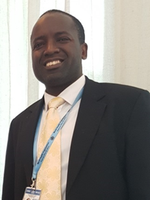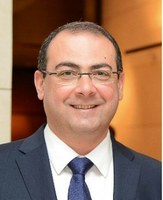Capacity Building for Digital Health Leadership
Join MEASURE Evaluation, the International Telecommunications Union (ITU), and the World Health Organization (WHO) Regional Health Office for Africa for a one-hour webinar on February 5 at 8am EST focusing on a curriculum designed to strengthen digital health leadership and workforce capacity in low-resource settings.
The use of digital technology for health plays an increasingly important role in supporting the information needs of health systems. Strong leadership and governance are crucial for coordinating digital health initiatives and building capacity for digital health opportunities. It is equally important that countries and organizations have a strategy for capacity building that is appropriate to the needs and status of the health information system (HIS). Presenters will discuss tools and resources for digital health capacity building. Presenters will also discuss use of the HIS Stages of Continuous Improvement tool to determine the stage or status of the HIS to inform a plan for digital health capacity building.
Presenter Biographies
Manish Kumar, MPH, MS
 Mr. Kumar currently works as the senior technical specialist for health systems strengthening at MEASURE Evaluation, a five-year project funded by the United States Agency for International Development (USAID). Kumar is a global leader in health informatics, HIS, and digital health with more than 16 years of experience. He has led the design, implementation, and institutionalization of national and subnational HIS while working closely with ministries of health and development partners. He has been a core team member of the health data alignment activity with the United States President’s Emergency Fund for AIDS Relief (PEPFAR) and the Ministry of Health (MOH), an effort that focuses on aligning PEPFAR and MOH health management information system (HMIS)/HIS to enable data exchange and data use. He has conducted HIS assessments and supported development of HIS policy and strategy documents. He has designed and implemented HIS capacity-building curricula at the national and subnational level. Kumar is a member of several health informatics and HIS technical working groups and has supported global efforts led by WHO, ITU, Inter-American Development Bank, the Centers for Disease Control and Prevention (CDC)-Africa and the Health Data Collaborative.
Mr. Kumar currently works as the senior technical specialist for health systems strengthening at MEASURE Evaluation, a five-year project funded by the United States Agency for International Development (USAID). Kumar is a global leader in health informatics, HIS, and digital health with more than 16 years of experience. He has led the design, implementation, and institutionalization of national and subnational HIS while working closely with ministries of health and development partners. He has been a core team member of the health data alignment activity with the United States President’s Emergency Fund for AIDS Relief (PEPFAR) and the Ministry of Health (MOH), an effort that focuses on aligning PEPFAR and MOH health management information system (HMIS)/HIS to enable data exchange and data use. He has conducted HIS assessments and supported development of HIS policy and strategy documents. He has designed and implemented HIS capacity-building curricula at the national and subnational level. Kumar is a member of several health informatics and HIS technical working groups and has supported global efforts led by WHO, ITU, Inter-American Development Bank, the Centers for Disease Control and Prevention (CDC)-Africa and the Health Data Collaborative.
Derrick J. Muneene
 Mr. Derrick Muneene is a dynamic and visionary digital health expert, with 20 years of experience, including 14 years in digital health. He works for the World Health Organization Regional Office for Africa (WHO-AFRO), where he is responsible for the design and execution of WHO AFRO’s long-term digital health strategy for the 47 African countries in the Africa region. He is currently WHO-AFRO’s regional eHealth technical advisor and focal point as well as the focal point person for the WHO and ITU digital health roadmap for Africa. He has designed and led digital health interventions on electronic health records (EHRs), digital health learning programs, monitoring and evaluation (M&E) tools, and eHealth governance documents. He holds master’s degrees in information systems management and in public health.
Mr. Derrick Muneene is a dynamic and visionary digital health expert, with 20 years of experience, including 14 years in digital health. He works for the World Health Organization Regional Office for Africa (WHO-AFRO), where he is responsible for the design and execution of WHO AFRO’s long-term digital health strategy for the 47 African countries in the Africa region. He is currently WHO-AFRO’s regional eHealth technical advisor and focal point as well as the focal point person for the WHO and ITU digital health roadmap for Africa. He has designed and led digital health interventions on electronic health records (EHRs), digital health learning programs, monitoring and evaluation (M&E) tools, and eHealth governance documents. He holds master’s degrees in information systems management and in public health.
Prior to his role with WHO, Mr. Muneene worked with CDC for 12 years, as health analyst and applications development manager, where he provided technical support to the development of Zambia’s national EHR system and automation of the Zambia civil registration systems for births and deaths. Earlier, he worked with USAID’s Rational Pharmaceutical Management Plus Program as national information system development officer, where he developed software products and M&E tools for Zambia’s national HIV program.
Hani Eskandar
 Mr. Eskandar is the ICT applications coordinator at the ICT Applications and Cybersecurity Division of the Telecommunication Development Bureau of ITU. Mr. Eskandar currently advises several developing countries on eApplications strategies and policies, and assists in the technical implementation of digital health, agriculture, governance, and education projects. He has led the development of guidelines and best practices reports on eApplications, particularly on eHealth and eAgriculture. Mr. Eskandar is currently leading a major joint program with WHO to use mobile technologies to combat chronic diseases such as cancer and diabetes. He also coordinates a WHO-AFRO eHealth collaborative project and leads other collaborative initiatives with the Food and Agriculture Organization (FAO) and the United Nations Educational, Scientific, and Cultural Organization (UNESCO).
Mr. Eskandar is the ICT applications coordinator at the ICT Applications and Cybersecurity Division of the Telecommunication Development Bureau of ITU. Mr. Eskandar currently advises several developing countries on eApplications strategies and policies, and assists in the technical implementation of digital health, agriculture, governance, and education projects. He has led the development of guidelines and best practices reports on eApplications, particularly on eHealth and eAgriculture. Mr. Eskandar is currently leading a major joint program with WHO to use mobile technologies to combat chronic diseases such as cancer and diabetes. He also coordinates a WHO-AFRO eHealth collaborative project and leads other collaborative initiatives with the Food and Agriculture Organization (FAO) and the United Nations Educational, Scientific, and Cultural Organization (UNESCO).
Mr. Eskandar has more than 25 years’ experience in the field of ICT for development. With the International Federation of Red Cross and Red Crescent in Switzerland, the United Nations Development Program (UNDP), the Egyptian Ministry of ICT, and NGOs in Egypt, he was involved in development projects in the fields of health, education, eradication of illiteracy, community development, surveillance, monitoring, and evaluation (SME) development, and microcredits. Mr. Eskandar has a master’s degree in business administration from McGill University, Canada, and a master’s degree in social and economic development studies from University of Paris, France.













